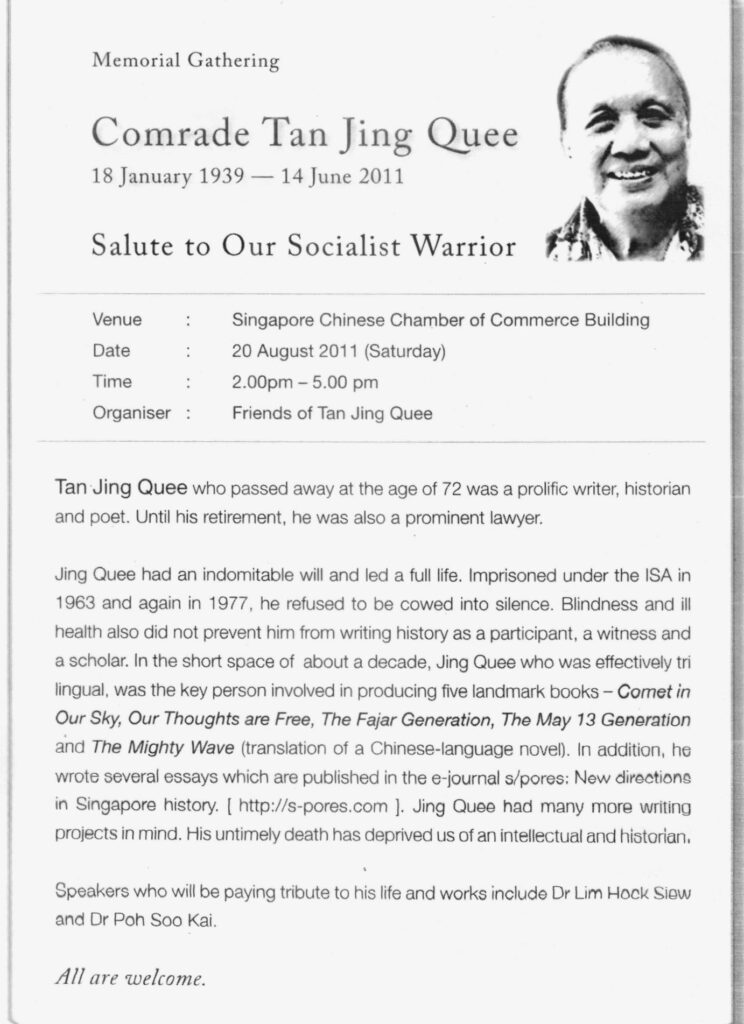by Teo Soh Lung


Comrade Tan Jing Quee, our Socialist Warrior, a compliment given to him by the late Dr Lim Hock Siew died today, 13 years ago. He was 72.
The late Mr Tan was a lawyer, public intellectual, historian, prolific writer and poet. He spent his entire life searching for Singapore’s forgotten heroes all over the world. Armed with their oral history, he worked and published almost single-handedly, several books including Comet in Our Sky, Our Thoughts are Free, The Fajar Generation, The May 13 Generation and The Mighty Wave. He was on the verge of writing a book on Operation Coldstore but because of his terminal illness and was almost totally blind, he managed only to communicate his thoughts on the book to Lysa Hong, the historian who later completed it with others.
Jing Quee found time to reflect and write about his life and family and even published a book of Singapore short stories titled The Chempaka Tree and an anthology of poems, Love’s Travelogue. He was going to embark on writing a play which he told friends, was “all in his head”. Unfortunately, he could not finish it. Despite his severe physical handicaps, his indomitable spirit saw him launch his last books, The May 13 Generation and The Mighty Wave at Singapore, Kuala Lumpur, Penang and Johore. He spoke eloquently and without text at all those launches.
The following is a Tribute from Dr Lim Hock Siew delivered at the Memorial of Jing Quee held at the Auditorium of the Chinese Chamber of Commerce Building on 20 August 2011.
TRIBUTE TO TAN JING QUEE
LIM HOCK SIEW
It is with a very heavy heart that I write of one of my closest comrades, Tan Jing Quee. Our relationship dated back to the early 1950s when we were students at the University of Malaya and Singapore.
Jing Quee joined the University Socialist Club and became one of the prominent and very active members. Our relationship was based on our common socialist conviction and ideals. In the club’s forums and discussions, he distinguished himself with his profound knowledge of philosophy, economics and socialist ideologies. I was deeply impressed by his knowledge of socialist ideals, its application in the political struggle at that time. He became the president of the University Socialist Club and the editor of the club’s organ Fajar.
During one of the club’s forums, Jing Quee was emphatic that the role of a socialist was basically different from that of a social welfare worker – the socialist role was to struggle for a social economic system and that totally eradicated the source of poverty and social injustice. The social welfare worker on the other hand, merely indulged in symptomatic relief of the illness of a capitalist society.
A few weeks before I was arrested in February 1963 during the Cold Store Operation, Jing Quee and a few other Socialist Club members came to see me at my home to discuss what they could do after our expected arrest. They were fully aware of their own arrest and detention should they take part in politics in that period but he displayed total determination to take up the challenge.
While in prison I learnt that Jing Quee had graduated from the university and instead of taking up a lucrative job, he plunged himself into a trade union movement with a meagre pay. He became the paid Secretary of the Singapore Business Houses Employees’ Union (SBHEU) and devoted himself to the improvement of the working condition of the members of that union composed of mainly English educated workers. In September 1963, he took part in the general election as a candidate for the Barisan Sosialis and was nearly elected, losing by a mere 200 votes to a PAP minister. As expected, after the general election, he together with other Barisan Sosialis candidates were arrested and detained without trial.
When he was released in 1966, the SBHEU was already banned and Barisan Sosialis was rendered ineffective by repeated waves of repression. Jing Quee decided to leave Singapore for UK to study law. In London, he helped to take care of Lim Chin Siong who was exiled from Singapore after he suffered a bout of acute depression.
After returning to Singapore as a lawyer, Jing Quee continued his interest in Singapore politics and in 1977 he was again arrested under the ISA together with about 20 other lawyers, graduates, trade unionists and political activists. During that detention, Jing Quee like most other detainees, was subject to mental and physical torture which he had vividly described in his poem ISA Detainee.
He was released three months later but Jing Quee became even more resolute rather than culled by his detention. He devoted himself to writing the alternative history of Singapore. His research in the British Archives revealed shocking evidence of the degree of collaboration and conspiracy of the PAP leaders with the British colonial authority. All these evidence form part of the books which he had edited namely, Comet In Our Sky and The Fajar Generation. Subsequently in spite of his terminal illness, he struggled valiantly to complete the editing of The May 13 Generation and The Mighty Wave even though he was very ill. In fact he was totally blind and physically disabled. He remained mentally alert and his fighting spirit was very high. He took part in the launch of the two books in Singapore and despite the fact that he was under medical treatment for his terminal illness, he travelled to KL and Penang to help launch the books.
Even in the last days of his life, he was trying to complete another book on the Cold Store Operation.
His untimely death deprive us of an intellectual who has devoted his life to the socialist cause. I am proud to salute a brave and dedicated socialist warrior, Comrade Tan Jing Quee.
***
You can read other tributes written by his friends at https://function8.sg/…/14/tan-jing-quees-13th-anniversary/

Leave a Reply